- Home
- Susan Copperfield
The Captive King_A Royal States Novel Page 6
The Captive King_A Royal States Novel Read online
Page 6
He’d probably found a communal hall where the Nahua and Maya could gather on peaceful terms.
I wouldn’t be the one to burst his bubble. I’d let one of his peers do it, and if he asked me why I hadn’t tipped him off, I’d just smile and tell him he was the doctor, not me. It was petty, but it was the name of the game.
The ones with the appropriate degrees didn’t like when the underlings got uppity.
I took my time getting a feel for the area, making a show of thinking about the ruins surrounding the temple. In reality, I hurt from the fall, and a wise woman would’ve done the excavation equivalent of the stop, drop, and roll. My ankle hated me, but since it held my weight, I ignored the pain.
I’d pay for that later.
Sebastian led me to an entry on the second tier of the temple, gesturing for me to follow. “When we found the chamber, it was untouched. We haven’t figured out how the debris stayed out yet. The antechamber had to be completely excavated; we’re still not done clearing it, but we have room to work now.”
I believed magic had existed long before it had swept over the world, broke the United States apart, and changed everyone. Few other archaeologists did. They refused to acknowledge the possibility magic had shaped ancient cultures as we were being shaped by our talents.
To them, science explained everything and there was no room for the mystical.
As long as I didn’t imply magic was responsible, I’d get through the conversation intact. “Find anything interesting?”
“We’ve uncovered a sacrificial altar, but it’s an oddity. There’s no evidence of human sacrifice, but there are carvings we haven’t been able to translate. Watch your step; underneath the dirt, the floor’s carved, and it’s easy to trip.”
The so-called antechamber was located in the heart of the temple, and the rain poured through a gaping hole in the ceiling. Water washed away the dirt, exposing the stone floor. I halted, and my mouth dropped open.
To learn a language, it was necessary to learn about the culture of a people; their culture often dictated how they spoke—and why they spoke. Culture began at birth for everyone, from the moment a mother held her child—or had her child taken away. Some cultures viewed life as sacred.
Others had a much cheaper opinion of imperfect life, including the famed Spartans. The prevalence of human sacrifice among the Nahua, the Maya, and other tribes in the region implied they didn’t value life.
I disagreed; they valued it so much that they believed shed blood could prevent the end of the world.
But for there to be death, there needed to be life, and the carvings etched in every inch of the room described the responsibilities of a husband and wife, beginning with their union. The principles of the blended Nahua and Maya societies surrounded me, dictating how men and women should build their families.
It began in the temple, where on the altar, the newly wed would tie the knot. It was unclear if they would share their first union in the eyes of the gods on the altar; I’d need days—no, months—to understand the nuances of what I skimmed.
The gods witnessed something in the room with an altar meant to celebrate the hope of new life.
“Holy shit, Sebastian.”
While I’d been gawking, he’d crossed the room, and he turned to face me. “What is it?”
“This isn’t a sacrificial altar.”
“It looks like one to me.”
Arrogant jerk. I pointed at the carvings on the floor. “It’s a marriage altar. These carvings describe how the new couple is expected to behave. I believe it also describes the actual marriage ceremony.”
“Are you sure?”
Would killing him really be that bad of a deed? “It’s in mixed Nahuatl and Mayan. I’m sure.”
“That’s going to look good as a credit for you once it’s been verified.”
I downgraded him from arrogant jerk to ignorant idiot out to screw me over again. “Suit yourself.”
“Come on, Summer. You know it’s my ass if I claim the purpose of any part of my site and it’s incorrect.”
“And the other translator will get top credit for the verification. Right. I know how this story ends. Just show me your discs so I can read them so someone else can get top credit for that, too.”
Maybe I should have toned back my bitterness, but I couldn’t force myself to apologize for my temper.
“You’ll get flagged as a critical part of the discovery team, I promise.”
I almost wished I was a flameweaver so I could light his ass on fire. “As an excavator, I bet.”
He shrugged. “It’s not my fault you don’t have your doctorate.”
“And you’re happy to take advantage of it, just like everyone else. You know exactly how much an on-site translator will cost you, and it’s more than what you have in your budget. Nowhere in our verbal agreement did it say I have to like your trickery. Frankly, I should screw around with you to force the verification. I won’t, though.”
Stepping around the altar, I halted long enough to investigate the remaining carvings, my brows rising as many discussed the horrific ways people would die if it was proven they’d violated their union. “Here are your sacrifice references. It boils down to remain faithful or have your still-beating heart ripped from your chest and offered to the gods.”
“Lovely.”
“They sacrificed a goddess for infidelity, Sebastian. Marriage was serious for the Nahua and the Maya. It wouldn’t surprise me if this temple was dedicated to the marriages of members from rival tribes; that would explain the mixing of languages. Don’t you have rudimentary translators on your team?”
“Until you cleaned the place up, most of the carvings were too encrusted to read.”
I shouldn’t have been surprised. “Right. Where’s the body?”
Sebastian pointed through the archway into the connecting room, and I peeked around him.
The corpse, gilded in etched gold, hung in the air. At first glance, I spotted nothing holding him in place. Hundreds of glossy stone discs, likely obsidian, littered the floor around his feet. I knelt, peering beneath the figure’s feet.
Nothing.
Shooting Sebastian an accusatory stare, I pointed into the room. “You have got to be fucking with me.”
“Go ahead. Climb on him. We all have. Your dissertation has been confirmed. It’s magic. Not only is it magic, it’s a type we haven’t seen before. I already notified the university. You’ll blitz through your defense.”
Any other day, I never would have heard better news, but I’d already made up my mind.
I was tired.
“I’ll blitz my way through my defense at a different university. Ours will still find a way to fail me so they can keep their specialized cheap labor.”
“You’re really bitter today.”
“I am. That’s what happens when an elite points out my willful ignorance. They’ll probably just claim this is unverified.”
“Way to throw my words back at me, Summer. Can’t you ever play nice?”
“I am playing nice. I cleaned your temple, didn’t I?”
“Only because you got so pissy it was still buried you flared.”
“I deciphered a few carvings in your antechamber.”
“I learned never to marry per Nahua traditions. For that, thank you.”
What an ass. “Warn all future girlfriends you aren’t loyal.”
“Lay off, Summer.”
“Then don’t tell me about your sex life—or suggest I become a participant. So, all the discs seem to be the same?”
I wanted to get my greedy hands on the shiny black discs and take a closer look at the markings etched into them.
“As far as we can tell. We haven’t scanned them yet. We’ve done basic scratch tests to determine they’re probably obsidian, but they’re weird.”
“You found them in the room with a floating corpse covered in gold and ancient writing. Were you expecting anything different?”
; “Not really. I’ve missed your smart mouth.”
I made a few educated guesses on why Sebastian hadn’t done any scans yet. Using the machines meant turning on the camp’s generator and blowing out a week’s worth of gas to run a few discs through the gauntlet of tests. It’d be cheaper to send someone to the airstrip, call in Miguel Ángel, and fly to Tepalcatepec to ship the discs to the university for full analysis.
Laze likely factored more than the expense; it took a lot of hours to run the tests, hours he had to personally supervise.
“Come on, Sebastian. I know it can be boring, but it’s important.”
“It’s a waste of gas for a common find.”
If Sebastian was trying to provoke me into a second flare, he was going about it the right way. “All right.”
Since I doubted I’d be getting anything of use out of him, I stepped into the room and nudged the obsidian discs aside. The metallic chink stopped me in my tracks. With wide eyes, I crouched and picked up a disc. It felt like obsidian.
I tapped it to the floor.
It sounded like metal. I hadn’t been imagining things.
“Are these metal or stone? You said they passed the scratch test for obsidian.”
“We’re not sure what they are. They look and feel like stone, but they sound like metal. We’re stumped.”
“Yet you won’t run the scanners.”
“Waste of gas. They’ll do a full analysis at a proper lab.”
“Right.” I set the first disc down and picked up another one, turning it over in my hands, examining the writing on both sides. The three outer rings of the Maya calendar decorated one side while much of the Nahua calendar decorated the other. The two shared similarities, and picking up the original disc I’d chosen, I checked to see how they overlapped.
While imperfect, they matched rather closely to their equivalent dates.
The central ring of both sides captured my attention; instead of the rest of the calendar, the inner ring had writing. “The outer rings are the calendars, one side for the Nahua, the other for the Maya. The inner ring isn’t part of the calendars.”
After checking both discs, I confirmed the writing matched on both sides and on both discs before setting them aside and selecting more discs to investigate. True to Sebastian’s claim, they seemed identical.
“Well, what does it say?”
I picked up the original disc and held it up. “Patience. I’m keeping this one.”
To prove I meant business, I put it in my pocket.
“I said you could have one.”
“I should take two so I can study both sides simultaneously.”
“Take two. We haven’t counted them yet.”
If I ever oversaw a dig site, I’d never allow men like Sebastian anywhere near my ruins. Instead of complaining, I pocketed another disc. “Got your fancy phone with you?”
“Always.”
“Charged?”
“Yes, Mom.”
Ew. “Record me reading this. I’ll read the Nahuatl first and flub my way through the Mayan; few speak this specific dialect, and once I’m done, I’ll try to translate to English.” The English translations would be a beast.
It was always difficult to match the image to the words they meant; a language in pictures often had subtle meanings only long study could reveal. I could spend months translating one side of the disc and come to several different conclusions, as the meaning of the picture could be changed in context.
Some runes were always the same, but language and dialect were fluid things.
Once, I’d seen a woman’s name written seven different ways, and each way had held a different meaning. Some were nicer than others, and that woman’s story hadn’t ended well.
She’d angered the gods, and the priests of her tribe had written her crimes into her skull before using it to decorate the temple.
Sometimes, the Nahua were a charming people. Others, they went out of their way to showcase their cruelty. It made them interesting to study, an enigma of a civilization.
“It worries me when you say you’ll try.”
I scowled and flipped him my middle finger. Why couldn’t anyone understand that the blending of languages turned a simple task into a challenge? If I only dealt with Nahuatl, I could readily decipher the writing without much effort. Every picture told a story. The style of the drawings often changed, but if I could discern the writing’s purpose, the pictures began to made sense.
Some words didn’t change much, including the glyph for husband and wife, namicitli. Monamictia, to marry, and monequiltia, to love, had been repeated faithfully in the altar room.
I oriented the disc according to the Maya solar calendar’s starting date, July 26. I liked that the Maya calendar began when the sun reached its peak.
The Georgian New Year was a cold time devoid of life.
Later, I would wonder at the Maya calendar’s incomplete state, including only the solar representations. I was certain there had to be a reason for it, but what that reason was, I couldn’t even begin to guess.
The first word was hualbemi, to be born, which I thought was a fitting enough beginning, aligned with the first day of the Maya year, a time of new opportunities and change.
Then the true challenge began, for after the Nahuatl word for birth, Maya influences crept in. While variants of Mayan languages still existed, spread over five different branches, I’d concentrated my efforts to Tzeltal and Tzotzil, which were still spoken in modern Mexico.
In a gesture of utter futility, I’d also studied Ch’olti’, an extinct dialect, which had once been spoken in Guatemala and Belize.
Under no circumstances should Ch’olti’ runes have been found where Tzeltal and Tzotzil dialects reigned alongside Nahuatl.
Why hadn’t I noticed the Ch’olti’ runes at my first look? I’d always found them distinctive compared to other languages.
Nothing about the disc’s writing made sense, and my tongue tied as it always did when I tried to speak an extinct language.
Part in frustration, part in impatience, I began again, speaking exclusively in Nahuatl, translating between the dialects to the best of my ability. The story began at the birth of a boy, painting the picture of a perfect love fated from their first breaths. The perfect union was of a man exactly five years the elder of his bride, walking the world before her time so he might pave the way for their family’s success.
She would grow and find him as a young maiden not yet wise in the ways of the world. He would reach adulthood first, and upon finishing his training as a warrior, he would return to her.
The story claimed their love was written on their hearts, forever binding them together, even beyond the gates of death.
According to the calendar, they would wed in the darkest season on the darkest day. This would allow their love to become a beacon in the night and a promise of the future.
The Nahuatl words for love and marriage blended with Ch’olti’ and Mayan on the disc. I jumbled it, only the mon discernible.
The disc heated in my hand, and a blood-red light engulfed me.
Chapter Five
I woke in darkness, and the pressure of stone, dirt, and stale air smothered me. Breathing hurt; my lungs strained for oxygen while my heart pounded an erratic beat in my chest.
Terror clamped its cold hands around my throat and squeezed.
The first time I’d been caught in a cave in, before my talent had fully flared to life, I’d come within a hair of death. I’d been young—too young to have magic—but it’d come at my call anyway. It’d been my parents’ fault. They’d wanted me to follow in their footsteps, hunting for glittering treasures. Neither one of them ever admitted they dug in the dirt for a living.
Mining for precious metals and jewels was not digging in the dirt. Digging in the dirt was an insult reserved for those seeking long-lost treasures of the past, and they believed what had been lost should remain lost.
Because of them, I’d hunted throu
gh old mine shafts, looking for what they thought were treasures. The collapse had trapped me in a small section of tunnel, pinning me between lethal, stagnant water and unrelenting stone.
I’d foolishly believed everything would be all right. I hadn’t known much about science and hadn’t realized every breath depleted the breathable air. The deadly truth had crept up on me, but I knew the pressure in my chest for what it was.
Within minutes, if that, I’d black out.
Then I’d die.
In the collapsed mine, panic had triggered my flare, and my talent had punched a hole through solid stone, opening a passage large enough for me to crawl through. I’d reduced rock to powder.
I’d crawled my way to freedom, and I’d refused to go anywhere near my parents’ beloved mines again.
Times had changed and so had I. My talent had grown, although it would take days—or weeks—to fully recovering from my flare. While weak, my magic was mine to control, and I could judge from the pressure of the earth around me which way led to air, life, and freedom.
Even after the flare, even with weakness smothering me, I could open an airway so I could breathe, regroup, and escape.
When I cared enough about what lurked in the ground, I could sense every rock, every grain of sand, and even the colder presence of metals and crystals, just like my parents had wanted for me. I was so used to the prevalent and oddly slimy presence of decay in the jungle that its absence broke my concentration.
What sort of soil lacked life?
My talent honed in on the material surrounding my nose and mouth, and realization struck me. It wasn’t soil.
It was sand.
I focused my attention on my goal and punched my talent through the path of least resistance, the two feet required to reach the surface, burrowing through and reinforcing the hole so it wouldn’t collapse in on itself. Hot, dry air blasted into my face, unpleasant but breathable.
I could move mountains of sand if I wanted; of all the soil types, sand cooperated the easiest. It flitted away from my talent as though blown by a gusting wind. Despite the common belief Mexico was a dry, acrid place, clay, loam, and mud engulfed much of the kingdom, leaving few desolate places.

 Cold Flame
Cold Flame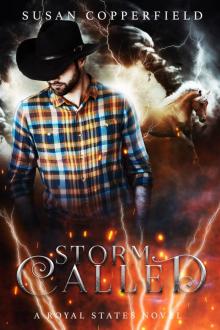 Storm Called
Storm Called Bonds
Bonds Null and Void
Null and Void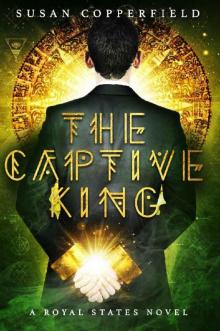 The Captive King_A Royal States Novel
The Captive King_A Royal States Novel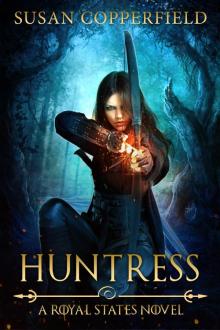 Huntress
Huntress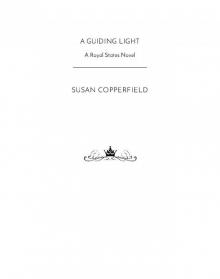 A Guiding Light
A Guiding Light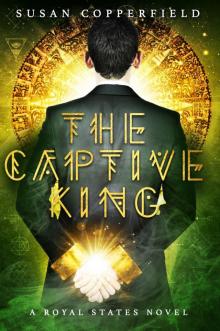 The Captive King
The Captive King A Guiding Light_A Royal States Novel
A Guiding Light_A Royal States Novel